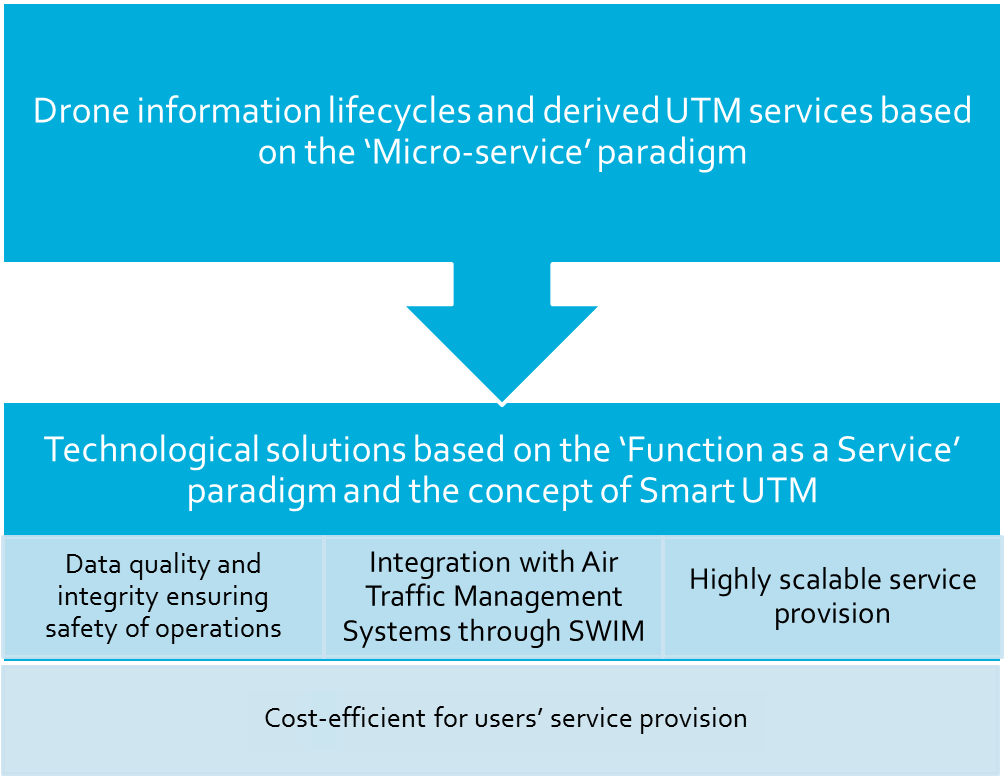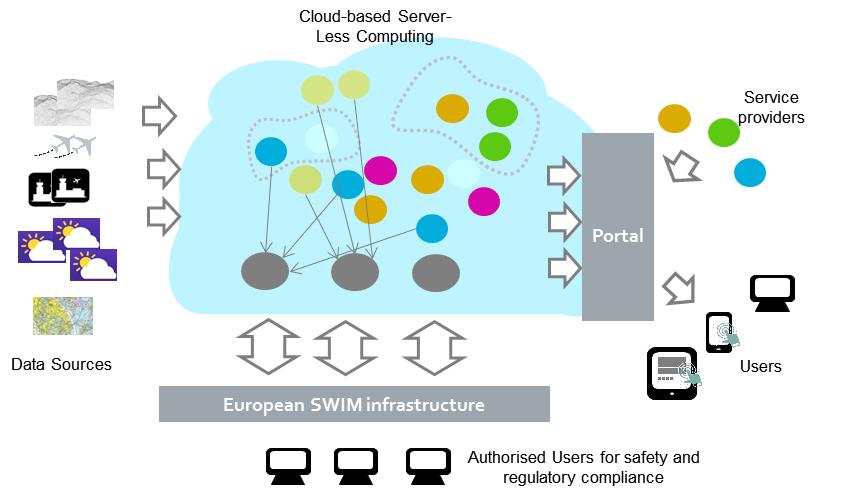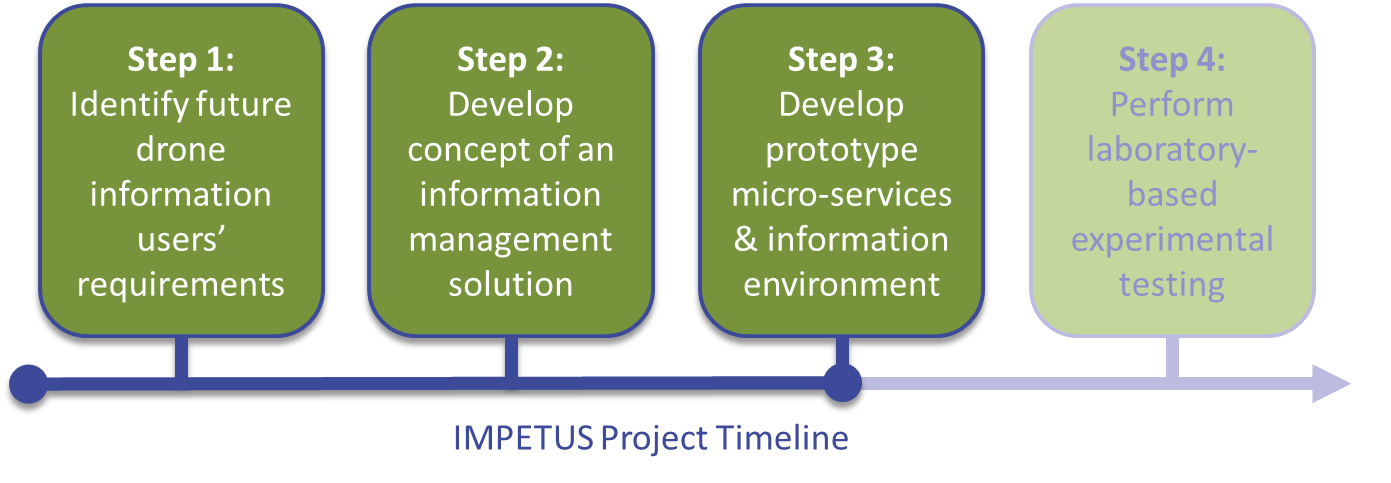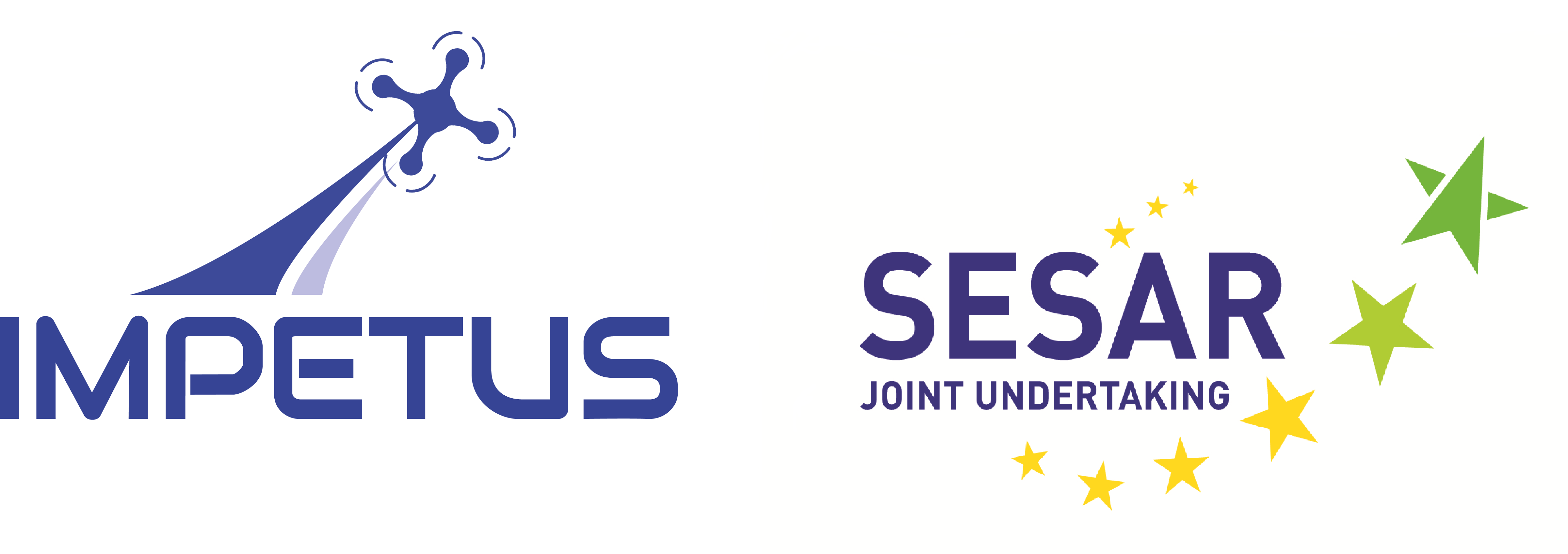IMPETUS Objectives
IMPETUS analyses the information management needs of drone operations in very low-level (VLL) airspace. The project also proposes technologically and commercially feasible solutions to address those needs.
IMPETUS contributes to the European framework dealing with the facilitation of the growth of the drone market, as a future generator of significant economic growth and societal benefits. The project is included in the first batch of drone-centric activities selected and funded by the SESAR Joint Undertaking to foster the development of the U-space system, which aims to enable complex drone operations with a high degree of automation in all types of operational environments.
The solution developed in IMPETUS builds upon existing Traffic Management information systems addressing key issues such as data quality assurance, data integration needs with the Air Traffic Management (ATM) systems and scalability of the drone information services to multiple users with diverse business models.
IMPETUS will advance the state of the art in two main areas:
| 1. Drone information lifecycle that best supports the flight lifecycle, with a view to defining a set of U-space services that leverage the data to provide the users with knowledge and wisdom, which will ultimately lead to safe and efficient operations. U-space services will be researched on the basis of the use of the ‘micro-services’ paradigm, aiming at exploring lightweight decoupled services, with a clearly defined functionality (focused on a specific capability) and simple interactions. These micro-services will be also characterized by the fact that they could be leveraged to build a more complex, modular composite service, and by allowing users to leverage information created by other users, e.g. services based on exploiting historical position data and sensor readings from a large number of missions to extract information that may be useful to enhance the safety or efficiency of future missions. To that aim, the project defines a set of flight lifecycles models (considering pre-flight, in-flight and post-flight) to describe the main types of drone operations in Very Low Level (VLL) airspace, focusing on operations without positive Air Traffic Control (ATC), including B-VLOS (Beyond Visual Line of Sight) and VFR (Visual Flight Rules) and considering the different types of vehicles and missions expected to be flown in this context. | 2. Proposal for a technological solution to deliver the U-space services that should be characterized by its scalability to respond to multiple users with diverse business models, its mechanisms to assure the data quality and integrity, and its flexibility to facilitate the integration with manned traffic management systems. Solution will be researched on the basis of the cloud-based server-less computing, leveraging the ‘Function as a Service (FaaS)’ paradigm, which allows for highly scalable service provision at potentially much lower costs than standard cloud-based deployment. In the FaaS paradigm, the cloud provider manages the virtual machines necessary to implement the service request, which are billed according to a measure of the computing resources required to satisfy the request, rather than per virtual machine, per hour. Service providers and users will interact through a public portal, which will incorporate a market place to access services in different forms, e.g. applications, data, APIs (“API Store”), etc. |

IMPETUS also researches on the application of the Smart Concept to the design of the envisioned U-space system. The main driver of this concept is to ensure an optimum management of the U-space system with respect to measurable performance indicators relevant for the U-space such as costs, safety, security or scalability. This concept will be supported by emerging IT technologies to gather, curate, process and deliver data-driven services, including Big Data (BD) and Internet of Things (IoT). Special emphasis will be done on open source technologies provided that they are able to supply the required functionality. Among other challenges, IMPETUS will look into how these technologies allow fusing data from diverse sources of information on a massive scale to enable quality assurance centralized services to support safety, security and oversight. As an example, drones’ navigation and surveillance will require the integration of ADS-B or radar data with emerging approaches such as sensor-based navigation in GPS-denied environments.
How the proposed solution can be connected to the European SWIM infrastructure is another objective of the project. The connection is envisaged as based on B2B services to leverage specific services and functions to authorized users and to take advantage of existing governance mechanism such as registry. This will allow providing a solution to the U-space that goes beyond current drone information services which are provided at local level, facilitating additional categorization and standardisation.
IMPETUS Approach
IMPETUS takes into consideration drone market needs and previous emerging technologies to propose a cloud-based server-less environment based on the use of the Smart concept and the application of ‘micro-services’ and ‘Function as a Service (FaaS)’ paradigms to deliver a solution which will be cost-effective, scalable and capable of enabling both market-based mechanisms for information provision as well as public governance and oversight required for safety and regulatory compliance.

Previous solution is expected to result in a dynamic ecosystem of new services to enhance safe and integrated drone operations. IMPETUS micro-services will be characterized by being small, self-contained units of execution with well-defined API. Each service will be decoupled from the rest and deployed individually, having a reduced operational complexity. Micro-services will have a fully automated lifecycle, allowing the scalability of the overall system in order to support the RPAS growth. They will minimize bandwidth & latency in order to enable the consumption of the services through mobile devices with subpar connections. They will be designed to ensure that micro-service developers will not need to care about service placement or infrastructure specifics, ensuring security requirements.
On the other hand, it is important to design an attractive solution for all parties in order to ensure fast adoption for industry acceptance and to prevent overregulation, which could lead to industry stagnation. A great deal of the success of the current drone services applications comes from the flexibility and easiness of deployment they provide. Therefore it is essential that the new solution and set of micro-services offered by IMPETUS try to preserve this freedom while meeting all safety requirements from an ATM perspective. As the information set that the drone operator could get through IMPETUS is also going to make its operation easier this can compensate for some rules that they will have to follow.

The IMPETUS approach is based on the analysis and identification of the needs of the future drone operators and service providers in order to define a conceptual model of drone information micro-services as well as a cloud-based architecture which will give answer to the identified needs.
This conceptual model and its selected architecture constitute the IMPETUS Solution fulfilling the requirements in terms of scalability, safety, efficiency and cost-effectiveness of the drone operations. The technical and commercial feasibility of this solution will be demonstrated by means of laboratory-based experimental tests using a prototype of the IMPETUS Solution containing the required functionality to allow the integration of a set of micro-services which jointly provide enough evidence of the fulfilment of project’s objectives.
The project will implement proper mechanisms to use the expertise internal to the consortium and to also ensure the feedback of key stakeholders. These mechanisms will be mainly a set of workshops where information will be obtained related to current and future volume of traffic, drone operations, emerging IT technologies and their applicability to an Smart U-space Concept, and recommendations over the achieved results.
To complement internal knowledge, IMPETUS will consult its Advisory Board which will intervene at several stages of IMPETUS research activities to offer an enriched view of the industry and research community thus ensuring that IMPETUS solution reflects the needs of a wide range of business models and user’s needs.
IMPETUS will also perform a benchmarking with today’s drone information management systems. This will allow not only assessing the expected performance improvements of the future IMPETUS solution in comparison with today’s systems, but also analysing the cost implications within the envisioned market.
Following figure represents the stepped progress that the project will follow.

